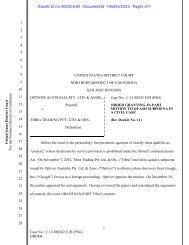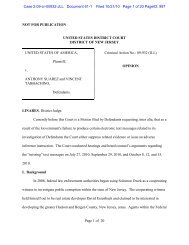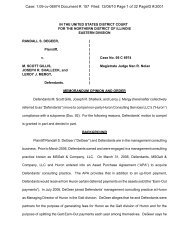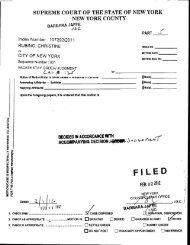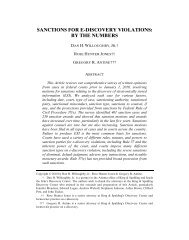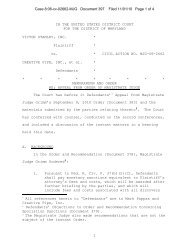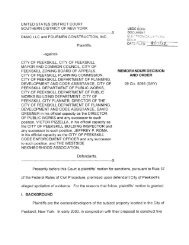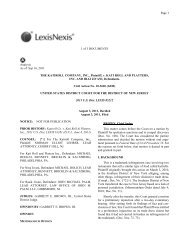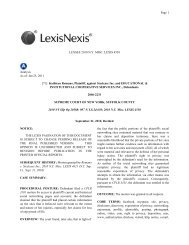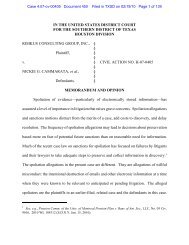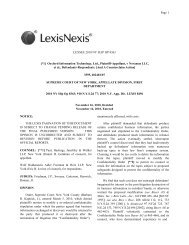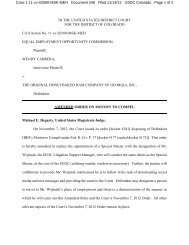Pippins v. KPMG, No. 11-377 - E-Discovery Law Alert
Pippins v. KPMG, No. 11-377 - E-Discovery Law Alert
Pippins v. KPMG, No. 11-377 - E-Discovery Law Alert
You also want an ePaper? Increase the reach of your titles
YUMPU automatically turns print PDFs into web optimized ePapers that Google loves.
Case 1:<strong>11</strong>-cv-00<strong>377</strong>-CM-JLC Document 106 Filed 10/07/<strong>11</strong> Page 6 of 19<br />
These costs would, <strong>KPMG</strong> argues, "swallow the amount at stake" in the litigation. (Def.'s Mem.<br />
at 2).<br />
Plaintiffs respond that they arc not averse to using sampling as a means to preserve a<br />
more limited number of hard drives at a lower cost. (Pis.' Mem. at 1). However, the parties<br />
have repeatedly disagreed on the methodology by which a meaningful sample could be obtained.<br />
(See Def.'s Mem. at 2). PlaintifTs raise three objections in response to <strong>KPMG</strong>'s proposal that the<br />
parties use keyword searches to create a sample of documents for preservation. First, they argue<br />
that any action that will result in the destruction of hard drives is premature because there has<br />
been insufficient discovery to enable the parties and the Court "to knowledgably craft a plan for<br />
preservation and production." (Pis.' Mem. at 12). Plaintiffs have indicated that it would be<br />
difficult, if not impossible, to generate search terms without the opportunity to first determine<br />
what the hard drives contain. (lll). Second, Plaintiffs argue that using keyword searches is an<br />
"outmoded method of data recovery" that does not ref1ect context or capture all relevant<br />
materials. (ld. at 15-16). Finally, Plaintiffs believe that the information they seek, which may<br />
demonstrate the Audit Associates' work product and hours worked, would not be culled using<br />
keyword searches. (Id. at 16).<br />
Likewise, Plaintiffs have suggested that any meaningful sample of documents or hard<br />
drives could not be obtained by searching an entirely random selection of hard drives because the<br />
sample would need to account for possible differences among potential members of the FLSA<br />
collective and the putative class in New York given <strong>KPMG</strong>'s argument that Plaintiffs are not<br />
representative of either group. (June 16 Tr. at 6). These differences include the geography or<br />
office locations of the Audit Associates; the client industries for which the Audit Associates<br />
6



